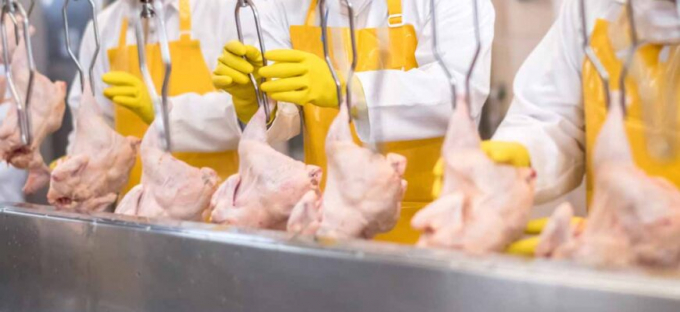November 27, 2025 | 20:50 GMT +7
November 27, 2025 | 20:50 GMT +7
Hotline: 0913.378.918
November 27, 2025 | 20:50 GMT +7
Hotline: 0913.378.918

Food is the source for most of those illnesses. The CDC says approximately one in every 25 packages of chicken sold at grocery stores contains salmonella bacteria.
The proposed U.S. Department of Agriculture rules would declare salmonella an adulterant — a contaminant that can cause food-borne illness — in breaded and stuffed raw chicken products. That includes many frozen foods found in grocery stores, including chicken cordon bleu and chicken Kyiv products that appear to be cooked through but are only heat-treated to set the batter or breading.
The agency notified producers of the proposed changes on Friday. USDA Deputy Under Secretary for Food Safety Sandra Eskin said it marks the beginning of a broader agency effort to curtail illnesses caused by the salmonella bacteria, which sickens 1.3 million Americans each year. It sends more than 26,000 of them to hospitals and causes 420 deaths, according to Centers for Disease Control and Prevention data.
Food is the source for most of those illnesses. The CDC says approximately one in every 25 packages of chicken sold at grocery stores contains salmonella bacteria.
Since 1998, breaded and stuffed raw chicken products have been associated with 14 salmonella outbreaks and approximately 200 illnesses, the USDA said in a statement. An outbreak last year tied to frozen breaded raw chicken products caused 36 illnesses in 11 states and sent 12 people to hospitals.
Better testing
The USDA has performance standards that poultry processing plants have to meet to reduce contamination, but the agency cannot stop products from being sold. There is also no adequate testing system to determine levels of salmonella in meat, Eskin said.
The proposed new rules require routine testing at chicken processing plants. Products would be considered adulterated when they exceed a very low level of salmonella contamination and would be subject to regulatory action, including shuttering plants that fail to reduce salmonella bacteria levels in their products, Eskin said.
"This action and our overall salmonella initiative underscore our view that our job is to ensure that consumers don't get sick from meat and poultry products," she said. "They shouldn't be sold if they're contaminated to the degree that people get sick."
In 1994, the USDA's Food Safety and Inspection Service took a similar step by declaring some strains of E. coli a contaminant in ground beef and launched a testing program for the pathogen.
Eskin said the agency met with food safety experts and poultry processors for ideas on how to reduce contamination in processing.
Representatives of the National Chicken Council, a trade group, and Tyson Foods said they would withhold comment until they received details of the new USDA rule.
Diana Souder, a spokeswoman for Maryland-based Perdue Farms, also declined to comment but pointed out that the company belongs to the Coalition for Poultry Safety Reform, a group formed last year to work with USDA and others to reduce foodborne illnesses from salmonella contamination.
The new rules will be published in the Federal Register this fall and the USDA's Food Safety and Inspection Service will seek public comment before finalizing the rules and setting a date for implementation.
(cbsnews)

(VAN) A new study reveals how the simultaneous effects of ocean acidification, salinity and loss of oxygen are making the world more fragile.

(VAN) Hopes are growing that the creation of the first 3D turkey gut model could be a turning point in the battle against the virulent blackhead disease.

(VAN) Tyson, America’s biggest meat supplier, plans to shutter one of its largest beef processing plants as the industry continues to struggle with low cattle supplies and political pressure from Washington.

(VAN) New FAO study shows how digital solutions are empowering farmers and fishers to prevent losses and build resilient agrifood systems.

(VAN) Brazil's COP30 presidency pushed through a compromise climate deal on Saturday that would boost finance for poor nations coping with global warming but that omitted any mention of the fossil fuels driving it.

(VAN) Poultry farmers in the UK have been warned that they could face one of the worst winters yet for bird flu.

(VAN) Prices of main-crop paddy have risen sharply, with jasmine rice hitting 16,100 baht per tonne — the highest level in years.